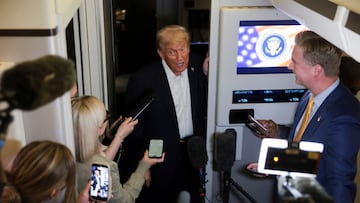Updated list of media outlets refusing to sign the Pentagon press policy
Media censorship in the United States is just another step towards authoritarianism in Trump’s world.


Since Trump 2.0 took office in the White House, he has made it his mission to stoke tensions with several major media organisations. Now, the overspill has reached the Pentagon, with disagreements rising over a newly proposed press access agreement.
The Defense Department is asking journalists to commit to a new set of rules governing coverage of military operations; but a growing roster of news outlets have declined to sign on, citing their first amendment rights to a free press.
At the core of this standoff is a policy that would impose stricter conditions on how reporters operate around defence activities, conditions these outlets argue would curtail independent journalism. It would require them not to publish material unauthorised by the Pentagon and while restricting access to certain areas unless accompanied by an official.
Rather than try to reach an agreement or drop the new restrictions, the immediate consequence from the Trump-led organisation is one of a five-year-old child: a blanket ban for journalists from refusing organisations, who may now be barred from certain Pentagon briefings or denied access to official military events.
The leader of the free world, so obsessed with free speech, certainly doesn’t like it when people say things he doesn’t want them to.
The Atlantic’s journalists will not sign the Pentagon’s press policy. Statement here from editor in chief Jeffrey Goldberg: pic.twitter.com/j1W48qSQuo
— The Atlantic Communications (@TheAtlanticPR) October 13, 2025
“We also steadfastly believe in the press protections afforded by the U.S. Constitution”
Among the most prominent holdouts are The Associated Press, and The New York Times, with The Washington Post, The Atlantic and Reuters on Monday also publicly joining the group; AP confirmed Monday afternoon that it would not sign, along with CNN, the The Guardian, NPR, HuffPost and trade publication Breaking Defense. Right-wing outlet Newsmax also declined to sign the agreement.
Each has publicly stated that accepting the new rules would - rightly - restrict their editorial independence.
“Reuters is bound by its commitment to accurate, impartial and independent news,” the agency said in a statement. “We also steadfastly believe in the press protections afforded by the U.S. Constitution, the unrestricted flow of information and journalism that serves the public interest without fear or favour. The Pentagon’s new restrictions erode these fundamental values.”
“The restrictions secretary Hegseth is attempting to place on the press are flatly unconstitutional,” Whitney Snyder, HuffPost’s editor-in-chief, said in a statement. “HuffPost will not agree to a document clearly aimed at snuffing out actual news-gathering at the nation’s largest and best-funded federal department.”
Who will be left covering the U.S. Department of Defense after tomorrow at 5 p.m.? Almost no one.
— Scott Nover (@ScottNover) October 14, 2025
Here's where things stand: https://t.co/LD7QlEUSwa pic.twitter.com/K1r820Nph4
“It’s what’s best for our troops and the national security of this country”
Pete Hegseth, the former Fox News contributor turned Secretary of Defence (now the Secretary of War), took to Twitter to threaten the outlets regarding these rules, which he proposed, before the Pentagon itself responded.
Chief Pentagon spokesman Sean Parnell said the rules establish “common sense media procedures,” adding that “The policy does not ask for them to agree, just to acknowledge that they understand what our policy is. This has caused reporters to have a full blown meltdown, crying victim online. We stand by our policy because it’s what’s best for our troops and the national security of this country.”
Still, the media organisations in question remain unconvinced. They contend the terms grant the Defense Department too much latitude in shaping who can attend press events and under what conditions. Some fear these measures may create chilling effects, discouraging tough questions or limiting coverage that reflects poorly on military leadership.
The NYT, Atlantic, WaPo, CNN, Guardian and others have all refused to sign Pete Hegseth new rules on reporting from the Pentagon. As far as I can tell only OAN has signed it. I guess this is Hegseth waving goodbye to their access to the Pentagon and other DOD facilities. pic.twitter.com/AHlkWAwrOk
— Ron Filipkowski (@RonFilipkowski) October 13, 2025
Related stories
The ultimate resolution remains unclear. If the impasse continues, press access to Pentagon events could be segmented, with some outlets granted entry, others forced to rely on secondhand reporting or limited briefings.
Get your game on! Whether you’re into NFL touchdowns, NBA buzzer-beaters, world-class soccer goals, or MLB home runs, our app has it all. Dive into live coverage, expert insights, breaking news, exclusive videos, and more – plus, stay updated on the latest in current affairs and entertainment. Download now for all-access coverage, right at your fingertips – anytime, anywhere.


Complete your personal details to comment